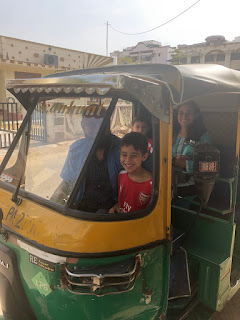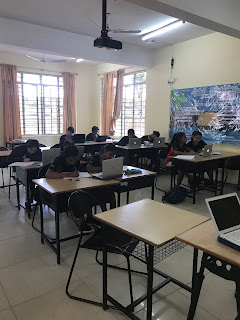Opportunity Knocks...

Yesterday, while John was planting a hops garden, I was at Indus International (my kids school and where I collaborate with a middle school teacher). My mentor asked me to come earlier than we normally meet because the middle school students are at a leadership camp all week so there was no class to observe. I was waiting in the library and she was over 20 minutes late and I started to wonder if we had reverted back to the beginning where there was no trust an no collaboration. As I wondered, I was confused. I thought we had made such good strides and have built a strong bond. Finally, she showed up and immediately my confusion was cleared. She right away asked me to create a mini-DTP on the Cold War. I was ecstatic! We have built a great working relationship and collaboration around the Design Thinking Process (DTP). So much so that she asked me to design it for the 11th grade (I have not been able to observe her 11th grade class—I am not sure why. I have my speculations of course.) She sent me the text they use (side note: which was fascinating to explore and compare to the US textbooks) and asked me to create 2 mini-DTPs one on the Cuban Missile Crisis and the other on Vietnam. I of course said no problem and that I would have something to her by Friday (I like to take my time and be very thorough). She looked at me and asked if I could have it sooner. I thought why not. It would be good practice for me to be able to come up quickly with a mini-DTP. Here is what I came up with:
Cold War
Mini-DTP-11th Standard
*Most DTPs
should be completed in pairs or groups.
The strategy build on people working in groups and building off each other’s
ideas.
1. Cold War: Cuban Missile Crisis
a. Key Ideas
1. Nuclear weapons are placed in Cuba
(approximately 90 miles from Florida) by Soviet Union. Missiles are facing the
United States and if executed would destroy the entire United States except for
Seattle, Washington.
2. US has missiles in Turkey facing the
Soviet Union which could destroy the Soviet Union if executed.
3. In the end, President Kennedy and
Khrushchev agreed to remove the missiles from their perspective places
b. MiniDTP -can be completed in pairs or groups of 4
1. Empathize: and research the destruction a
medium-range nuclear missiles would have on a society.
2. Define: The problem that exists with countries having
and building nuclear weapons today in the 21st century.
3. Ideate: Ways to end the building of and threatening
to use nuclear weapons
4. Prototype: Create 3 ways to resolve the issue
of building of and threatening to use nuclear weapons. Some suggestions or ways to help students think about prototyping:
1. Create a policy banning nuclear weapons-students would need to think
about what entity could produce such a policy statement i.e The United Nation.
2. Create a public interest group that lobbies governments.
3. Create a commercial ad of the importance of banning nuclear weapons.
4.
Create a newspaper article that
reports on the effects of nuclear weapons.
**Please note the above suggestions are ideas
for teachers to help students generate their own ideas if they are stuck.
2. Cold War: Vietnam (In this mini-DTP students are asked to
really research the people of Vietnam and to think about how they felt and what
they needed in terms of a government. Too many times governments are created
for the few elites and not the common person)
a. Key Ideas
1. North Vietnam and South Vietnam were
separated. North Vietnam followed Communism whereas the South followed a
Democracy.
2. Vietnam Conflict lasted over 10
years.
3. Vietnam is a Communist country today
b. MiniDTP -can be completed in pairs or groups of 4
1. Empathize with the people from Vietnam. What
was life like for them during the Vietnam conflict? What could the governments
do to help the people of Vietnam?
2. Define: What type of government is best for the
people of Vietnam Why? (a question that
is in the textbook might be good to help them with the define stage is—Evaluate
the effect of the Cold War on Vietnam from 1945 to 1975)
3. Ideate: Types of Governments that would be best for
Vietnam.
4. Prototype: 3 Types of Governments that would be
best for Vietnam and Create a Constitution for each type of Government. (Students can present these forms of governments and Constitutions in
the form of a documentary, poster, or podcast.)
It took me
an hour and I emailed it to her as soon as I was done drafting my ideas. I
learned that it can be done quickly and as a teacher, I appreciated that and am
convinced even more that this is something I want to implement in my classroom.
Here is her email response:
Dear Brinda,
Your DTPs are
extremely good! We will discuss about them on Friday.
Warm regards,
Mitali
Can’t wait
to hear her feedback on Friday!




Comments
Post a Comment